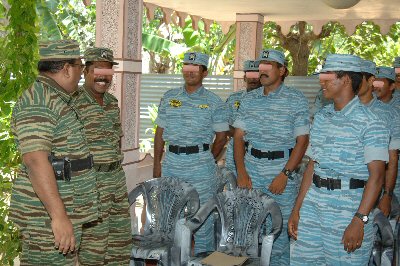 |
|
LTTE leader Velupillai Pirapaharan with the Air Tigers crew.
Photo LTTE |
Aircraft of the Liberation Tigers launched their third raid on April 28, attacking oil and fuel storage sites of the Sri Lankan Air Force (SLAF) near the capital, Colombo, sending shockwaves through the government and the military establishment.
The pre-dawn air raid on March 28 by the Tamileelam Air Force (TAF) air craft triggered panic in the capital as the authorities cut electricity plunging the city into darkness while security forces peppered the skies with gunfire.
But the erratic firing by Sri Lankan forces failed to bring down the tiger planes and they returned to the safety of their base in Wanni.
Many people in the capital were watching the Cricket World Cup final between Australia and Sri Lanka when the LTTE planes dropped bombs on Kolonnawa and Muththuraajawala oil facilities at 1:50 a.m. and at 2:05 a.m. on Sunday.
"We were watching the match when the lights went off. Within minutes the night sky was brightened with anti-aircraft fire," a local resident told the BBC.
"After about 30 minutes the firing ceased. After a lull of about an hour there was a second round of firing. A plane could be seen flying westwards towards the Indian Ocean."
Media reports quoting officials reported fire pumps at the Kolonnawa gas storage depot situated eight kilometers north of Colombo were set ablaze by the attack and the Muththuraajawala oil refinery was shut down.
LTTE military spokesperson Rasiah Illanthirayan told Reuters the TAF attacks were in response to an earlier air raid by Sri Lankan Air Force (SLAF) planes in LTTE administered Wanni.
"We sent two squadrons to target facilities that provide fuel to military aircraft after two Sri Lankan air force jets bombed a suburb of Kilinochchi just past midnight,"
Warning that the LTTE air raids would continue as long as the SLAF planes keep bombing, he told Reuters "The Sri Lankan military, especially the air force, are adamantly trying to prove they will always seek a military solution."
"So we have no other way than to take our own measures," Illanthirayan added. "There will definitely be more. We have no choice other than striking back."
The attack, second raid on Colombo by tiger planes, has forced the Sri Lankan government to urgently seek more advanced air defence systems and introduce an array of security measures to prevent an embarrassing repeat.
"This is a new dimension, we are trying to get some more advanced systems." said military spokesman Brigadier Prasad Samarasinghe speaking to reporters.
Following the attack acting civil aviation director general Parakrama Tissanayake announced, as a security measure, starting May 10 Sri Lanka’s only international airport Katunayake International Airport (KIA) 10 miles north of Colombo will be shut between 10pm and 4.30 am.
In addition, Sri Lankan air force has introduced continuous patrolling of skies above Colombo at nighttime to detect and prevent any future attacks.
Despite the stepped up security, the attack has left Colombo residents experiencing the same fear that residents in the north had felt for decades.
"There is no difference between the north and south as residents in both these areas now live in fear of air attacks", agencies reported quoting Ananda Gunawardena, a resident close to the capital.
Reacting to the attack international airlines suspended flights and tourists cancelled holidays to the island.
Dubai based Emirates, the owner of Sri Lankan Airlines – the national carrier - and Hong Kong based Cathay Pacific suspended flights to Colombo whilst Singapore Airlines announced that it would only operate in Colombo during day time.
Tourists cancelling holidays, added to the flight cancellations has already led a 36 per cent drop in visitor numbers through the Katunayake international air port which saw four million passengers passing through last year.
Shutting down of the air port at night is expected to affect tourist in flow further pushing the tourism industry into dire straits.
This is the third air raid by the LTTE’s newly unveiled air wing.
The first ever air attack by the LTTE planes hit the air force base adjoining the Katunayake international airport on March 26.
Whilst Sri Lanka denied there was any damage to their fleet from the six bombs dropped by the LTTE planes Indian analysts suggested attack has reduced Sri Lanka air force capability by as much as much as 40%.
The second air attack took place on April 24 when LTTE air crafts dropped bombs inside the sprawling Palali military base in Jaffna peninsula destroying an engineering complex and an ammunition dump.
According to local residents secondary explosions were heard for as long as 5 hours indicating extensive damage.
Whilst the military command has ridiculed the tiger planes as a joke seasoned military analyst see it as highly effective and potent threat to the Sri Lankan forces.
"Although the LTTE's acquisitions appear primitive, they have clearly demonstrated through their last four sorties the helplessness of the government to protect its own airspace," said Iqbal Athas, an analyst with Jane's Defence Weekly said Reuters.
"The air force still doesn't appear prepared to meet with the air threat from the LTTE."
The LTTE sees their newly unveiled air force as an addition to their growing state infrastructure.
According Illanthirayan "The air actions open up new possibilities in the military, political and diplomatic fields." reported the Hindustan Times.
"We have territory, administrative, judicial and law enforcement systems; an Army, Navy, and now an Air Force. Let's call a spade a spade, we are a state!" he said.


